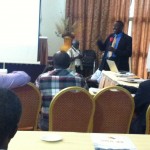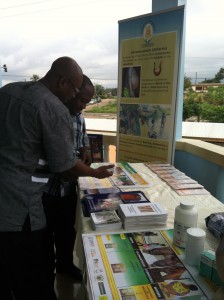Collaborating for Results in Ghana: Public-Private Partnerships and NTDs
September 24th, 2014

Ghana NTD Programme Deputy Manager Dr. Ben Marfo presents at the 36th annual meeting of the SPMDP. Photo: FHI360
Each year, members of Ghana’s Society of Private Medical and Dental Practitioners (SPMDP) gather at the SPMDP’s annual meeting to discuss new trends in healthcare and issues of common interest.
After consistent advocacy by Ghana’s Neglected Tropical Diseases (NTD) Programme, this year the SPMDP chose to focus its 36th annual meeting on building its members’ capacity to identify, diagnose and manage neglected tropical diseases.
The medical and dental practitioners who attended the conference, held in Koforidua in Ghana’s Eastern region on August 7-10, 2014, received Continuous Professional Development (CPD) credit for their participation. Doctors and dentists are required to earn CPD credits each year as a prerequisite for renewing their professional license with the Ghana Medical and Dental Council, the country’s accreditation agency for health professionals.
At the meeting, NTD programme managers explained the use of preventive chemotherapy (PCT) for five NTDs—lymphatic filariasis, onchocerciasis, schistosomiasis, soil-transmitted helminthiasis and trachoma. They also discussed protocols for the diagnosis and management of Yaws, Leprosy, Bruli Ulcer and Trachoma.
Ghana Deputy NTD Programme Manager Dr. Ben Marfo said, “it’s important to bring the private sector on board so they’re in a better position to diagnosis, treat and if necessary refer NTDs to public health authorities. They’ll also be in a better position not just to diagnosis, but also to manage these conditions [NTDs] as well as treat serious adverse events (SAEs) from taking NTD drugs, should such situations arise.” [While SAEs are extremely rare, there have been very occasional cases in Ghana.]
Since the costs of NTD diagnosis and treatment are covered for National Health Insurance Scheme (NHIS)-accredited facilities, financial compensation is largely a non-issue for much of the private sector. Nevertheless due to the widespread perception that NTDs are public-health concerns, “NTDs are neglected not just in public health, but also by the private sector in Ghana,” according to Dr. Marfo.
He said that in the past, there was little coordination between the public and private healthcare sectors on NTDs. However according to Dr. Marfo, the private sector has an important role to play in diagnosing and managing these diseases, which are widespread across Ghana.
“The challenge now is to get the private sector—all of them—on board. And then for Ghana Health Services, the other challenge is that once we get them all on board, we need to be able to collaborate with them effectively,” he said.
According to Dr. Marfo, the Ghana NTD Programme plans to improve coordination with the private sector “by putting our plans into practice.” This includes participating in meetings such as the SPMDP annual meeting, he said, as well as building private practitioners’ capacity to diagnose and manage NTDs through workshops and review meetings.
To assist the Ghana NTD Programme in building NTD capacity within the private sector, END in Africa mounted an exhibition at the SPMDP annual meeting to provide private practitioners with educational materials and information on the 5 NTDs that are treated using PCT. The Ghana NTD Programme also provided information and materials on bruli ulcer, leprosy and yaws.

NTD Exhibit at the 36th annual meeting of the Society of Private Medical and Dental Practitioners. Photo: FHI360
During the meeting, Dr. Marfo spoke about the work of the NTD Programme. Dr Agana Nsirre presented the Yaws Programme, focusing on changes in the treatment strategy and how to identify and appropriately manage yaws. In addition, Dr. Edwin Ampadu presented information on Bruli Ulcer, Dr. Oscar Debrah presented on Trachoma and Dr. Otabil presented on Leprosy.
Representatives of several pharmaceutical companies also attended the event and added to private practitioners’ NTD knowledge through mounted exhibitions, side presentations and new product introductions.
Overall, the SPMDP’s 36th annual meeting succeeded in accomplishing two NTD Programme goals. First, it provided an opportunity to renew and strengthen collaboration between the NTD programme and SPMDP members. Second, it offered an ideal venue for updating the private sector on changes in NTD diagnosis and treatment; and thus, it put Ghana one step closer to controlling and eliminating neglected tropical diseases.
Listen to the full interview with Dr. Ben Marfo, Ghana Deputy NTD Programme Manager.


